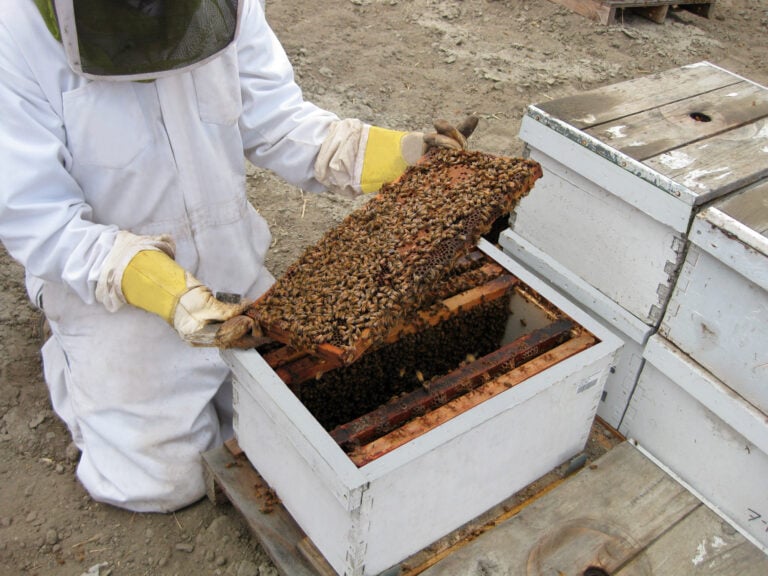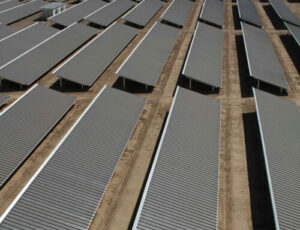
Wonderful Co., a $5 billion privately held company based in West Los Angeles, is the world’s largest farmer of tree nuts, one of the nation’s largest citrus growers and operator of the world’s largest flower delivery service. Its iconic brands include POM Wonderful pomegranate products, Wonderful Pistachios and Almonds, Fiji water and Teleflora flowers.
Its co-owners are billionaires Lynda and Stewart Resnick, who rolled up various farm and consumer products operations over 40 years to form the agriculture giant.
Wonderful also has one of the most ambitious and multifaceted sustainability programs, ranging from drip irrigation and other water conservation strategies to finding markets for its fruit and nut byproducts, operating beehives and building solar farms. In addition, the Resnicks in 2019 announced they were donating $750 million to the California Institute of Technology for a center to support environmental, climate change and sustainability research – one of the largest single donations ever to any university.
The top Wonderful Co. executive overseeing all these sustainability programs is Steven Swartz, executive vice president of strategy and technology. Swartz joined Wonderful in 2018 after a lengthy career as a partner at global management consulting firm McKinsey & Co. specializing in resource efficiency and technology.
Swartz took time out from his schedule last week to discuss Wonderful Co.’s wide-ranging sustainability programs with the Business Journal.
QUESTION: Wonderful Co.’s website states the company has spent more than $600 million to date on sustainability practices at its operations. How has that money been spent?
ANSWER: We’ve spent about $400 million on improving the efficiency of our water irrigation systems. Another $130 million has gone toward our solar power generation programs. And we’ve spent more than $100 million to create and maintain the Kern Water Bank, where we store water in wet years and draw down water in dry years.
We also include in our overall sustainability spending the $750 million on the Caltech donation (make by the Resnicks personally).
What’s the overall philosophy guiding all this spending?
We want to be a leader in sustainable agriculture. We see our role in figuring out how to flow sustainability innovations into a for-profit operating business. We want to be more connective and innovative on the sustainability front than anybody in agriculture. We have a broad portfolio of a lot of different sustainability approaches. We have never been limited by owners’ (Resnicks’) ability and capacity to invest in this.
One of the most pressing sustainability issues today is water. With California in the midst of yet another drought, what steps has Wonderful Co. taken recently to reduce water use?
We have pulled out some orchards, starting this past winter. That’s one of the few big levers we can use to reduce water consumption. We can’t just decide not to plant a tree crop one year: once planted, trees take up to seven years to mature and then produce nuts for many decades. We typically end production in our almond orchards after 25 years; with the drought, we have taken steps to pull orchards out of production a year or two early.
Any other steps?
Nothing that has changed in the past year or two. Of course, we have taken many steps over several years to reduce water use – or produce more crops using the same amount of water. We use precision irrigation on 100% of our crops, including drip irrigation, fan irrigation and micro-jet – or full-circle – irrigation. We also recycle the water used in our Lost Hills nut processing facility, which is the largest facility of that type in the world; that water is used to irrigate surrounding crops. And we maintain our Kern Water Bank, the largest privately operated underground water storage project in California.
According to the website, Wonderful has developed pistachio “super trees” that have up to 30% more yield for the same amount of water applied to the trees. Just what are super trees?
The super trees are the result of selective breeding over 25 years. For about 15 years, we individually harvested and measured production of over 10,000 pistachio trees in our orchard. We then determined the genetics of six trees that were the most productive and figured out how to propagate those trees.
So these are genetically modified trees?
No, they are not. Let me be very clear here: We as a company do not use any genetically engineered trees or crops – none anywhere. It’s a company policy. What I’m talking about here is old-fashioned genetic breeding: the same type of process that (Austrian monk Gregor) Mendel used in the 19th century: selective breeding to bring out certain traits. We started planting these specially bred trees about six or seven years ago. For the same amount of water, we get 30% to 80% more nut production, depending on the exact type of tree being used.
Turning to solar energy generation, we ran a story a couple years back about Wonderful installing solar panels on the roof of its Halo citrus processing facility. What other steps has Wonderful taken on the solar front?
We went dramatically bigger. We have built one of the largest privately-owned solar power generation facilities: over 100 acres in size at our pistachio and almond processing facility in Lost Hills. Its capacity of 30 megawatts is roughly 11 times the capacity of the Halo facility. That was commissioned this past November. It was built on ground that was fallowed and now produces more than 90% of the electricity for that nut processing facility.
Any other steps?
We’ve done four large projects at our farming operations that provide about 40% of our electricity for water pumping. All of these steps have put our solar generation at just under 50% of our total electricity used on all our U.S. sites.
Wonderful Co. also cultivates bees – lots of them. How and why did this come about?
The declining bee populations are the origin of this effort. About six or seven years ago, we found that our almond trees were blooming but that only about half the flowers were getting pollinated because of low-quality bee colonies we were using from third parties. So we set about to develop our own bee colonies, where we could establish firmer control of the entire process, including the logistics. The bees need to be in place when the bloom occurs: if they arrive a week too late, then we lose much of the pollination.
Are these bees being cultivated only to pollinate Wonderful crops and trees or are you selling bees to other agricultural companies?
Right now, it’s just us. We’re covering 75% of our pollination needs with our own bees. We now have about 80,000 hives. We’re growing that business: our goal is to have 100% of our acreage be pollinated by our own bees.
What about your Fiji water operations? Any sustainability efforts there?
Yes. We’ve made a commitment to shift packaging to 100% of recycled PET (polyethylene terephthalate) bottles by 2025. We’re now in the process of doing that.

What about the Fiji water resource itself?
We also manage that aquifer sustainably, carefully calibrating the (water) withdrawal rate versus the natural recharge rate. We’ve so finely tuned this that we believe that the aquifer will last for centuries more, at the very least.
On the huge $750 million donation to Caltech announced three years ago, where do things stand now?
Initial site preparation work started this past November on the $150 million physical facility to house the sustainability research and related programs. A formal groundbreaking is scheduled for next month. It should open for the fall semester of 2024. We’re also continuing to grow the Resnick Sustainability Institute that will occupy the new building.
Any other sustainability measures that we’ve not covered?
Yes. It may not be sexy, but one place that we’re putting an enormous amount of focus is byproducts innovation. What we sell is about one-third of the total weight and mass that the trees produce. Every nut has a hull, a shell and a kernel. If we package the kernels for consumption, that leaves the hull and the shell. For pomegranates, after we’re done juicing them, what’s left is a husk. We’re putting a tremendous amount of effort to finding sustainable high-value uses for our byproducts. We’re now selling over 75,000 tons of pistachio shells to two heavy industrial companies that are using them for bio-based energy, replacing fossil fuels.
And what of the pomegranate husks?
We have launched the POM Innovation Challenge: a $1 million prize competition for uses for juiced pomegranate husks. We have two finalists at this point: one is making a high antioxidant powder and the other is making edible food fiber.
When did all this effort begin around finding uses for byproducts?
We’ve been doing this for years, but when I joined the company four years ago, I greatly accelerated the development of byproduct markets. It was a screaming opportunity for us that we were not taking full advantage of us.
Any other sustainability efforts?
We’re in the process of installing electric vehicle charging stations at our California operations: we’re looking to have 100 stations online by the end of this year. We’ve also converted some of our farm locations to renewable diesel. It’s not technically biodiesel, but using renewable resources such as plant oils and food waste to produce fuel that’s molecularly identical to fossil diesel fuel. We’re working with Neste Renewable Solutions (a unit of Espoo, Finland-based Neste) – one of the largest producers of renewable diesel.
Anything else?
I mentioned earlier that we’ve been taking some almond trees out of production early. We are now recycling almost 100% of the almond trees that we remove. That involves grinding the wood and spreading it into the soil. For any wood that isn’t suitable for reincorporation into the ground, we’re processing it into wood fiber to sell to building or lumber companies for use in building products. As far as I know, we’re the only farming company recycling 100% of the wood that we take out of production.
